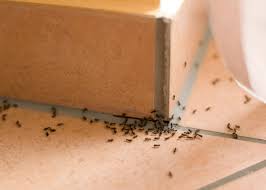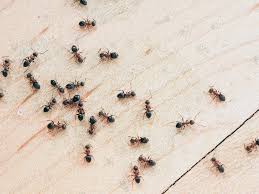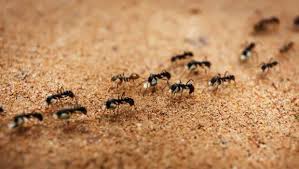How can I get rid of ants?
Ants make for terrible houseguests: They come uninvited, get into everything, and are in no hurry to leave. Even in the best of times, they’re unwelcome. But if you, like many people, have been spending far more time at home because of social distancing, the little critters could very well drive you insane.
Through the warmer months, the two types most likely to show up are carpenter ants and odorous house ants, aka house ants. When their natural habitat is destroyed, ants seek out alternate food sources, which is what brings them indoors.

Inspection
To get your ant problem under control, inspection is an important first step.
To find ant nests, follow their trails. Ants lay down a chemical pheromone trail along their established routes to and from a food source so other ants can easily find the food.
Inside a house, inspect along the carpet edges, doors, windows, and all areas of the kitchen. The easiest way to find a trail to the nest is to watch where ants go after reaching the food source. If you are targeting Carpenter ants, inspection at night is more effective since the larger Carpenter ant is nocturnal. You can spot Carpenter ants emerging from damaged wood inside the house, or foraging outside in woodpiles, rotted or water-damaged wood, and tree stumps.
Outside the house, inspect around foundation walls, areas of vegetation, and mulch. Any vegetation found near patios and walls may hide some Ant nests or their trails. Check under any item that is on the ground. Some ant nests are well hidden.
- Follow the trail to find the nest.
- Treat the nest directly if possible or use bait or non-repellent insecticide around the perimeter of the house and on the ant trails.

What exactly is an Ant Repellent?
The definition of repellent is as follows: “a substance that deters insects or other pests from approaching or settling.” Basically, an ant repellent does as its title implies: it repels ants. This means creating a barrier that the ants no longer want to cross and instead search for somewhere else to go.
Some repellents can work, however, in the end you’ll just be redirecting the ants, and they may find another entryway into your home. Repellents don’t kill the colony, and if that’s what you want to do, then you may want to use a bait instead.
Repellents can be liquid sprays or dry substances. A few common DIY ant repellents are:
● Cinnamon
● Essential oils (peppermint, lavender, eucalyptus)
● Chili Pepper (sprinkled liberally)
● Whole cloves
● Chalk lines
● Baby powder (talcum powder)
● Coffee grounds
● Cucumbers
● Vinegar spray
● Salt/water solutions
● Dish soap/water solution
When you have your repellent, be sure to spread it around cracks, holes, window sills, along baseboards, corners, and outside the perimeter of your home. Ants prefer to walk in single-file straight lines, so when you apply your repellent, keep that in mind.

How to Keep Ants Out of Your Home For Good
- Seal those entry points. Caulk and seal any cracks or exposed crevices in doors and windows.
- Hide the sweets. Black garden ants (fun fact: they’re actually dark brown!) are the most likely invaders. Keep food—especially honey, maple syrup, and sugar—in airtight containers or tightly wrapped with foil or plastic wrap.
- Do your chores. Regularly clean countertops and floors where crumbs are most likely to hide. And keep that pet food stored between feedings and regularly clean those pet bowls.
- Take out the trash. Make sure trash cans (especially in the kitchen!) are covered, and after you take out the garbage, inspect the can for any residue that might be lingering.
Natural Ways To Eliminate Ants
1. Diatomaceous earth (silicon dioxide)
Diatomaceous earth is a type of silica. It comprises fossilized remains of aquatic organisms called diatoms. Diatomaceous earth isn’t a poison. It kills ants and other bugs by absorbing the oils in their skeletons, which dries them out. Since it’s an irritant, avoid breathing in diatomaceous earth or getting it on your skin.
2. Glass cleaner and liquid detergent
Combining spray-on glass cleaner with liquid detergent or dish soap can help deter ants from entering your home. It does this by removing the scented pheromone trail they leave behind when they walk. Mix together and spray on areas where ants seem to congregate or originate from. Wipe down the area after spraying, leaving a light residue. While there are no studies to support this remedy, anecdotal evidence suggests it’s enough to keep ants away.
3. Hand soap
If the scent of glass cleaner bothers you, using hand soap may be enough to remove ants. Soapy water of any kind removes the scent of ant pheromones. Use it on ant trails and points of entry in your home. Without pheromone trails to follow, ants are unable to communicate with each other.
4. Pepper
Since ants seem to find the smell of pepper irritating, you can try black or red (cayenne) pepper as an ant deterrent. This remedy to ant infestation is completely natural and safe. Anecdotal evidence suggests that sprinkling pepper around baseboards and behind appliances may help keep ants at bay.
5. Peppermint
Peppermint is a natural insect repellent that may be very effective at repelling ants and other bugs, such as mosquitoes. Mix 10 to 20 drops of peppermint essential oil with 2 cups of water. Spray the mixture around the baseboards and windows of your home. Let dry. Like most essential oils, keep peppermint oil out of reach of pets, especially cats, who can become very ill if exposed.